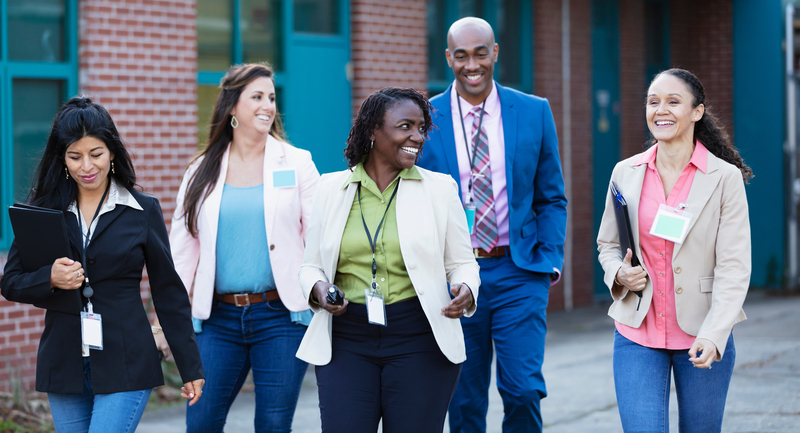Turnaround principal and philanthropist Liz Dozier has spent her career working to disrupt structural inequities within her Chicago community—and beyond. In 2016, Dozier launched Chicago Beyond, an impact investor that supports equitable research, community leaders, and local initiatives that work on behalf of young people in the area. Dozier will speak at the ASCD Annual Conference on Sunday, March 20. We caught up with her to talk about her philanthropic work, tips for leaders, and her fight for equity.
1. Tell me about your career as a principal in Chicago. How has that experience shaped how you lead today in your philanthropic work?
For context, Fenger High School, where I was named principal in 2009, was one of the lowest-performing schools in the state of Illinois. It had about 1,400 students, a 20 percent yearly dropout rate, a 40 percent graduation rate, and about 300 arrests inside the school building on any given year. We also had 30 to 40 percent of incoming freshmen at a 3rd grade reading level or below. During my tenure as principal—with the support of teachers, students, parents, our team—the dropout rate fell to below two percent and arrests went down to less than 10. We were moving students two or three reading levels a year. We had really invested in the foundation of what I am doing today.
When we make our work human-centered and focus on what our children truly need—and take our own ego out of it (sometimes there's a lot of ego in being a principal or a teacher)—we really get proximate to the issue and ultimately end up moving leaps and bounds. It’s about listening to what people have to say, valuing their opinions, and really trying to meet people’s needs. That’s what happened at Fenger High School.
2. What do you think was key to the dramatic turnaround at Fenger?
I really believe our students’ potential was always there. It wasn’t like we somehow waved a magic wand and sprinkled fairy dust. It was the responsibility of myself, other leaders, teachers, and team members in the building to set up an ecosystem that nurtured our children in a way that allowed them to be the fullest version of themselves—and that allowed them to rest. Our students experienced trauma on a consistent basis by virtue of some of the challenges they faced in the community around violence and poverty.
Since our students were constantly in a heightened state, it became important to have things like anger management and grief counseling built into the course of the school day. It was also important to have our team members trained in restorative justice and social and emotional intervention philosophies. People think it’s this one program, or this one move, and suddenly all the dominoes fall and everything trends upward—but instead it was human-centered, just meeting the kids’ needs.
3. You've given a Tedx Talk on how you liberated your mind from others' preconceived cultural expectations. What are daily steps educators can take to similarly "decolonize" their minds from bias?
This might not seem intuitive when you think about decolonizing your mind, but one practical step is to take care of ourselves. There's this incredible pressure—with everything happening within our school systems and nationally—on teachers at home and also professionally. In order for us to begin to decolonize our minds in terms of our own bias, we have to take care of ourselves physically, mentally, and spiritually, because you can’t begin to unpack those biases if you’re worn down.
When we think about decolonizing our minds, it is really about remaining curious about the world around us and others’ experiences. Curiosity leads us to unpacking different notions or ways of being that may have been implanted from an early age. Especially in this time, as we think about race and racial equity work and what that means to us as individuals and as school and district leaders, that willingness to question our beliefs—why do I feel that or believe that?—ultimately serves our students.
4. What inspired you to launch Chicago Beyond? What’s the aim of the initiative?
It was really just about serving kids in our community. I saw firsthand how so many organizations deeply served and did such a great job meeting kids where they were and providing opportunities for growth. And I saw how leaders of those organizations struggled, similarly to how we struggled at Fenger, around things like funding, especially if they didn’t have a fancy grant writer or if they didn’t have a machine behind them to acquire resources. When I left Fenger, I started to think about how I could make an impact on a larger scale that allowed children to access tools to support their own growth. So, I started Chicago Beyond with the same framework I used to lead Fenger.
5. What advice would you give to school and district leaders who are facing pushback against racial equity work?
This is an interesting question, and there is no one right answer. But I do know it’s important as leaders of schools and districts to have our moral center grounded, to be aware of the immense magnitude of responsibility that we have for our children’s well-being, for their care, and ultimately for their future. When we ground ourselves as leaders in that principle, all the rest begins to fall into place and we can block out the noise.
I remember there were times at Fenger when I had to make really tough decisions, when there was a difference of opinion on how to center our children. But when I was grounded again in that moral center of responsibility as a leader—not that it was easy—it became a framework by which I could make decisions. It’s no different in racial equity work. It’s important as leaders that we have that center and that we’re constantly putting ourselves in that learning stance. No one shows up, from my perspective, fully “woke” and aware. All of us, including myself, are on a journey.
This interview has been edited for space.








